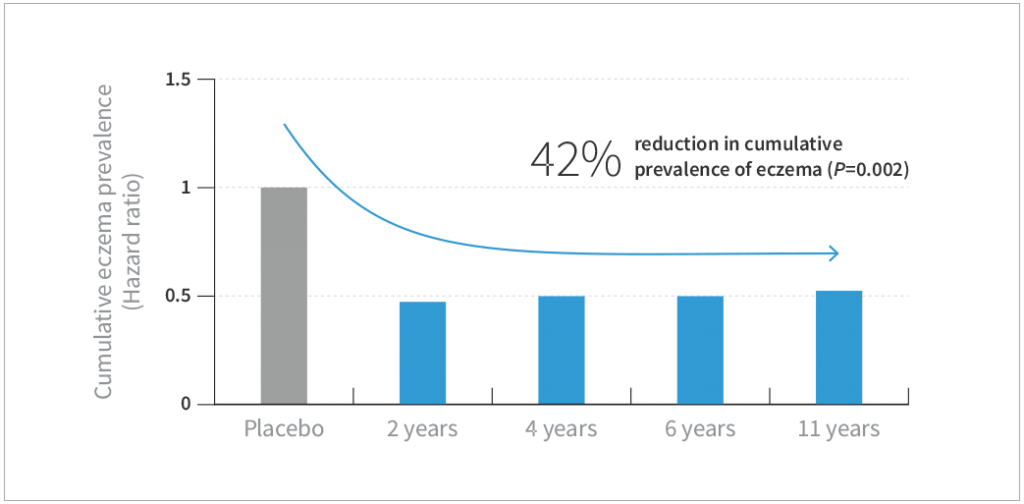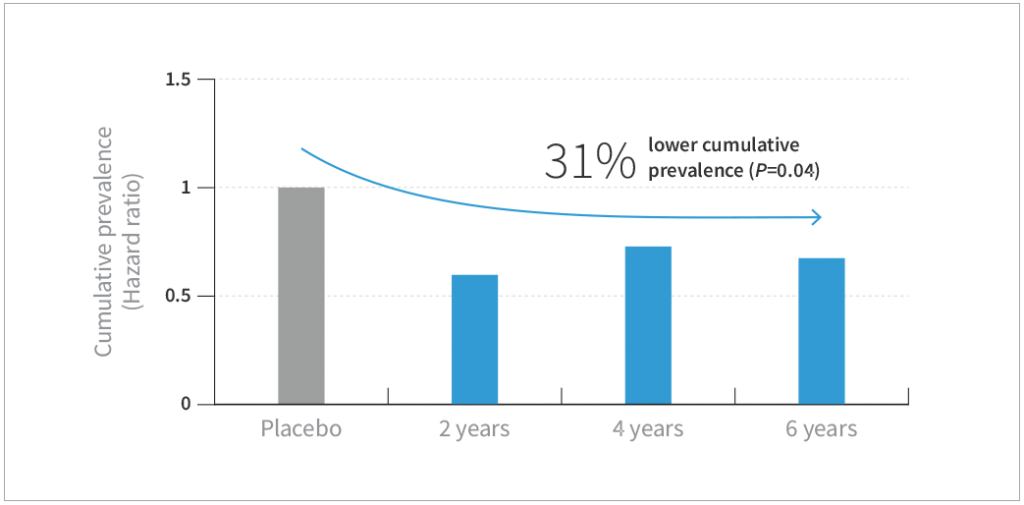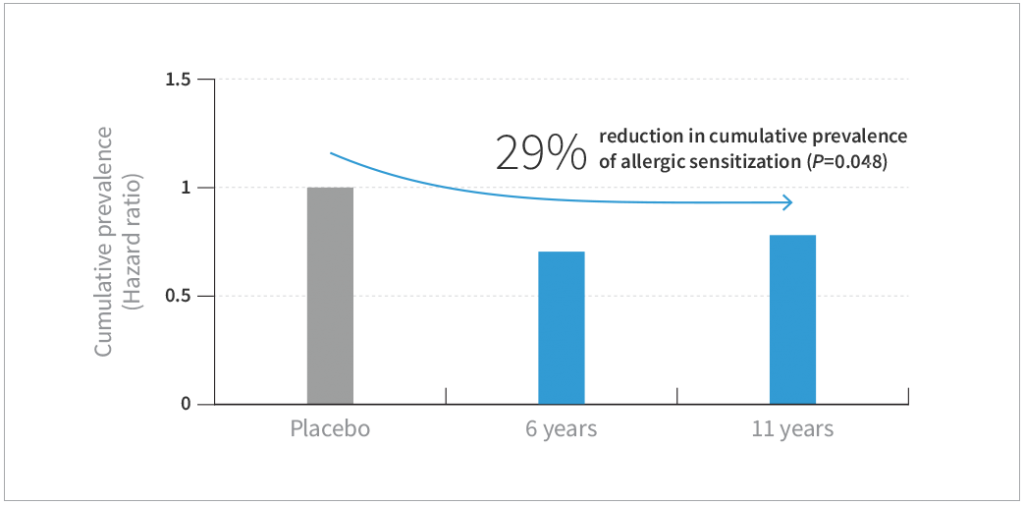Strong long-term clinical evidence demonstrated in a unique long-term study of eczema in children spanning 2, 4, 6, and 11 years
2-year follow-up: A differential effect of 2 probiotics in the prevention of eczema and atopy: a double-blind, randomized, placebo-controlled trial.1
4-year follow-up: A protective effect of Lactobacillus rhamnosus HN001 against eczema in the first 2 years of life persists to age 4 years.2
6-year follow-up: Early supplementation with Lactobacillus rhamnosus HN001 reduces eczema prevalence to 6 years: does it also reduce atopic sensitization?3
11-year follow-up: Effects of Lactobacillus rhamnosus HN001 in early life on the cumulative prevalence of allergic disease to 11 years.4
Study aim
To understand if the daily intake of L. rhamnosus HN001™ and Bifidobacterium animalis ssp. lactis HN019™* would reduce the incidence and the severity of eczema in children.
Study design
Two-center, randomized, placebo-controlled
Study method
- ~150 infants/children with family history of allergy were randomized to two treatment groups
- Placebo
- HN001™ 6 billion CFU/day
- Pregnant mothers were treated daily from ~5 weeks pre-term to 6 months post-term for breastfeeding mothers
- Infants treated daily from birth to 24 months old—treatments given as supplement to infant feeds (breast milk, infant formula, weaning food)
- Eczema prevalence and severity was evaluated by using:
- UK Working Party’s Diagnostic Criteria for atopic dermatitis modified for use in infants
- SCORing Atopic Dermatitis (SCORAD) cutoff ≥10 (to differentiate from rash)
- Health assessment was done at 2, 4, 6, and 11 years
Study results

- Study participants in the HN001™ group demonstrated a significant reduction in cumulative eczema prevalence (49%) at 2 years compared to placebo (P=0.01) and the effect continues over 11 years (42% lower cumulative prevalence [P= 0.002])
- Later analysis of 12-month data showed a 61% risk reduction in eczema prevalence compared with placebo
- A second study of HN001™ supplementation only to the mothers from 14 to 16 weeks gestation through 6 months postpartum if breastfeeding did not show risk reduction for eczema compared to placebo, indicating both mother and baby need to be supplemented

- Study participants in the HN001™ group demonstrated a significant reduction in cumulative eczema prevalence with SCORAD ≥10 (43%) at 2 years compared to placebo (P=0.009), and the effect continues over 6 years (31% lower cumulative prevalence [P= 0.04]). SCORAD was not assessed at 11 years.
- Later analysis of 12-month data showed a 39% risk reduction in eczema prevalence with SCORAD ≥10 compared with placebo (P=0.06)
- A second study of HN001™ supplementation only to the mothers from 14 to 16 weeks gestation through 6 months postpartum if breastfeeding did not show risk reduction in SCORAD compared to placebo, indicating both mother and baby need to be supplemented

- Skin prick tests measure an immune system reaction toward the allergen. Allergens bind to IgE antibodies on immune cells beneath the skin that release inflammatory mediators and cause the typical redness and swelling of the skin
- Results of the skin prick tests indicate children in the HN001™ group had a significantly lower cumulative prevalence of allergic sensitization compared with children taking placebo at 6 and 11 years (P=0.04 and P=0.048)
*HN019™ did not demonstrate any effect; therefore, only HN001™ results are shown.
REFERENCES:
1. Wickens K, Black P, Stanley TV, et al. A differential effect of 2 probiotics in the prevention of eczema and atopy: a double-blind, randomized, placebo-controlled trial. J Allergy Clin Immunol. 2008;122(4):788-794 2. Wickens K, Black P, Stanley TV, et al. A protective effect of Lactobacillus rhamnosus HN001 against eczema in the first 2 years of life persists to age 4 years. Clin Exp Allergy. 2012;42(7):1071-1079. 3. Wickens K, Stanley TV, Mitchell EA, et al. Early supplementation with Lactobacillus rhamnosus HN001 reduces eczema prevalence to 6 years: does it also reduce atopic sensitization? Clin Exp Allergy. 2013;43(9):1048-57. 4. Wickens K, Barthow C, Mitchell EA, et al. Effects of Lactobacillus rhamnosus HN001 in early life on the cumulative prevalence of allergic disease to 11 years. Pediatr Allergy Immunol. 2018 Dec;29(8):808-814. doi: 10.1111/pai.12982. 5. Wickens K, Barthow C, Mitchell EA, et al. Maternal supplementation alone with Lactobacillus rhamnosus HN001 during pregnancy and breastfeeding does not reduce infant eczema. Pediatr Allergy Immunol. 2018;29(3);296-302. doi: 10.1111/pai.12874.
